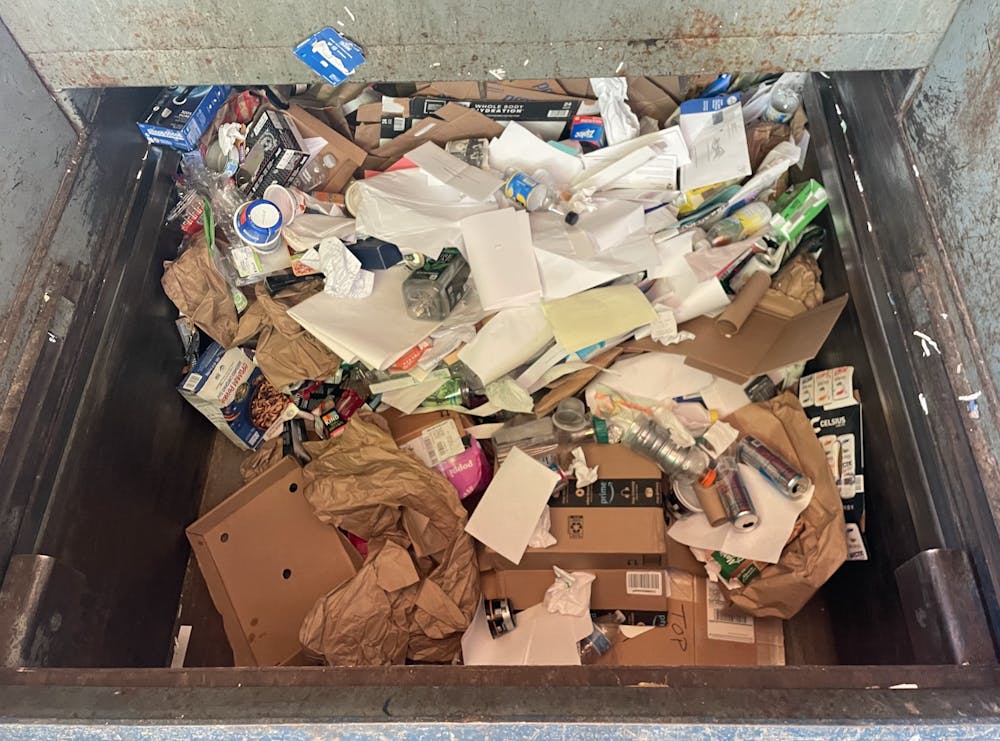The inner workings of Middlebury’s 30-year-old Recycling Center on College Street is a mystery to much of the Middlebury community. Whether Middlebury actually recycles, how it recycles and how one should effectively recycle on campus remain common questions even 30 years after the Recycling Center opened.
“In one of my classes, a bunch of students raised their hands and said that they had heard that Middlebury no longer recycles… and honestly I kind of believe that,” said Cara Fritz ’25.
Despite popular misconceptions, all recycling collected from blue bins in residence halls and academic buildings is transported on trucks, taken out of plastic bags and put into the recycling packer — a large storage container in the recycling center — which travels bi-weekly to the Addison County Solid Waste Management District. Smaller packers are located outside each of the dining halls and are driven to the transfer station more frequently.
After reaching the management district, located on Vermont Route 7 in Middlebury, the college’s recycling is loaded onto a recycling trailer and transported to the Materials Recycling Facility in Williston, Vt., according to the facility’s Public Outreach Coordinator Emily Johnston. This facility sorts out paper, plastic and metals.
Before recycling goes out to Williston, the college’s recycling center employs a method called “zero-sort,” which is a single-bin recycling tactic that allows for disposal of recyclable materials together without sorting them.
The no-sort policy means that if a bag of “recycling” is contaminated with paper towels or cups full of liquid — or during the Covid-19 pandemic, face masks — it immediately goes to the trash. This allows staff to be more efficient and streamline processes but also decreases the percentage of waste recycled. Currently, it is up to the individual facility services employees to decide whether they have time to manually open bags of recycling and remove the trash, according to Facilities Team Liaison for Waste Management Doug Smith. If they do not — which is most often the case, due to staffing shortages — a trash-filled recycling bin becomes landfill-bound no matter its content.
While zero-sort recycling decreases barriers to recycling by allowing people to throw all recyclable materials into one bin, Smith said he thinks this system may contribute to student confusion.
“If you look in a container now, you see paper, cans, bottles, stuff like that, so if you’re looking quickly at it, it looks like a mixture of everything… you might think anything can go in there,” Smith said.
Before the creation of the Recycling Center behind the Ridgeline Residence Complex’s parking lot in 1998, students spearheaded recycling efforts on campus by collecting the trash from residence halls and academic buildings and sorting it for disposal beginning in the early 1990s, according to Kim Bickham, supervisor for waste management and custodian.
“You could say that Middlebury was somewhat ahead of the game,” Smith said.
Since then, though, the amount of student engagement has significantly decreased, according to Smith.
Covid-19 served as a negative turning point for Middlebury recycling. Bickham said that before the pandemic the Recycling Center employed seven to eight full-time staff members and saw up to 30 student volunteers every week; this number is now zero.
After the Covid-19 pandemic, the Recycling Center stopped sorting recycling due to labor shortages and staff reallocation. The center currently has four full-time and two part-time staff members.
According to the yearly Waste and Recycling report, the percentage of total waste sent to the landfill in 2018 was 29.5%, which rose to 54.6% in 2020. As some sorting has returned, a decrease in that percentage has occurred over the past couple years, seeing 40.7% of all waste sent to the landfill in 2023.
One of the issues impeding the college’s ability to improve recycling efforts is a lack of funding, according to Bickham.
“I’m an advocate for going back to sorting. But, I’ve been told that there is no way we go back to sorting, it is just not economical,” Bickham told The Campus.
Smith, Bickham and Johnston all emphasized education as a major solution to negative recycling trends on campus.
“What is proven to work are routine reminders about what can and cannot be recycled that are clear, concise, and consistent. These reminders could be sortation signs, pamphlets, stickers, magnets, or other materials that showcase what is recyclable and what is not in an easy-to-understand manner,” Johnston wrote in an email to The Campus.
Bickham thinks that if Middlebury students were more compelled to help out in the recycling center, the recycling trends on campus might flip for the better.
“If every student had to work a two-hour shift in the recycling center once a year they would understand the cause and effect of their habits. Maybe then things would start to change,” Bickham said.




